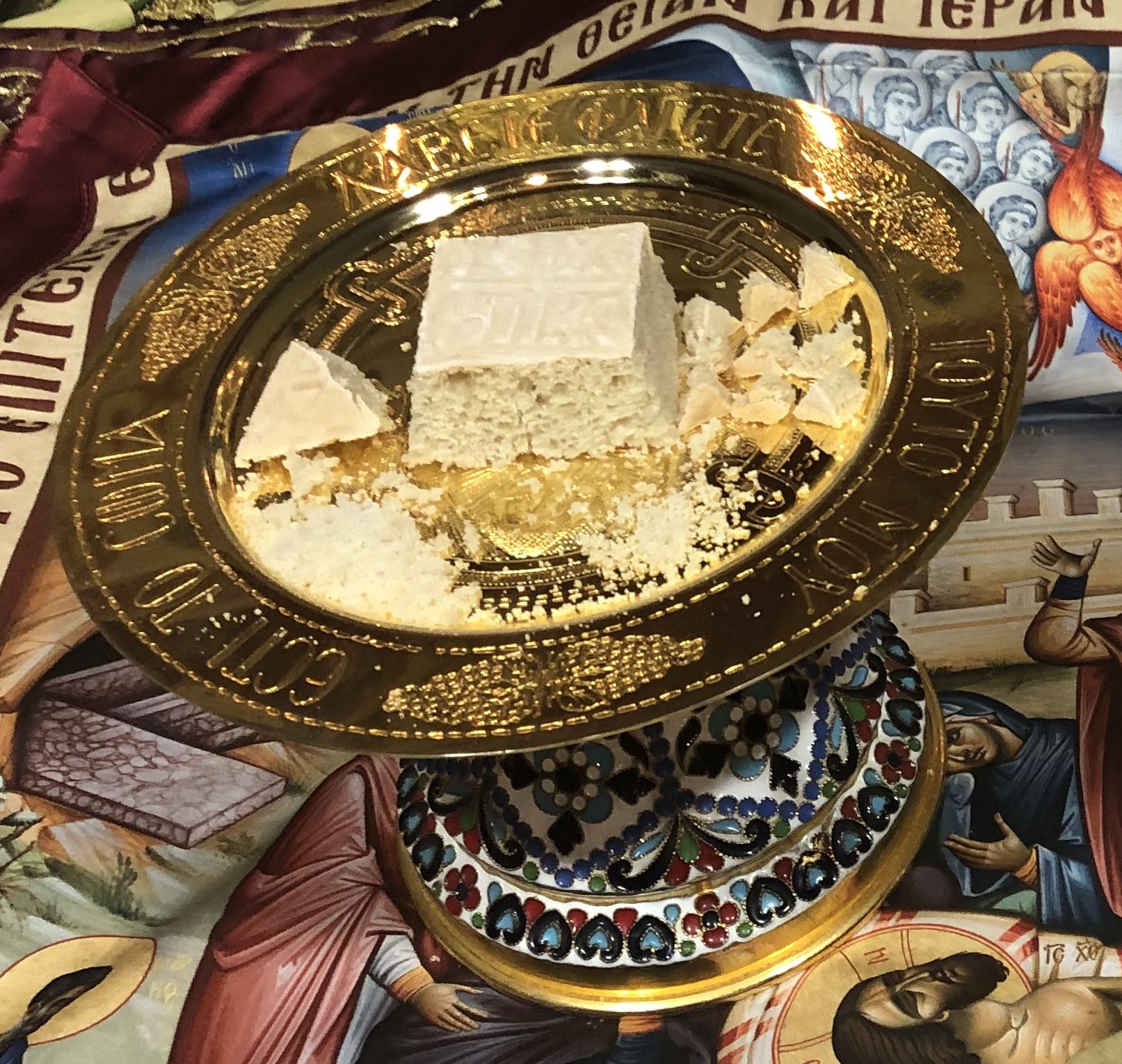Surely goodness and mercy shall follow me all the days of my life; and I shall dwell in the house of the Lord forever.
Psalm 23:6
He is Risen. He is not here.
Mark 16:6
I am writing this reflection on my 52nd birthday. Fifty-three years ago, on March 14, 1971, the Sunday of the Holy Cross, my parents offered a prayer, asking God for a son (they had been unable to have children), and promised to name him Stavros, for the Holy Cross and to give him back to the church as a priest. I was born one year later, same date, same hour as they made their prayer. I always knew the story of how I got my name, but I didn’t know about their promise until the day I told them I felt God was calling me to the priesthood. They never told me about the promise, they said, because they didn’t want me to feel pressured to become a priest, but to discern my calling on my own with no pressure from them. I was ordained a priest in 1998, and despite having served now for nearly 26 years, I still have questions, sometimes I still have doubts, and most definitely I make mistakes just like everyone else. The prospect of death doesn’t frighten me as much as the prospect of dying, of pain, needles, loss of control and other things. I know that the older I get, the closer I get to these things and this eventuality of dying. There is definitely more life in my rearview mirror than over my horizon.
If there really is nothing after death, then each birthday would be a cause of sadness, one year closer to nothing. However, because we believe, and I believe, that there is something after death, because I believe in God, in His goodness and in the salvation made possible through Jesus Christ, then each birthday brings me one year closer to entering the Kingdom of God. It also brings me one year closer to my judgment before Him.
The Orthodox icon of the Resurrection does not depict Jesus coming out of the tomb like Superman, having cheated death. The miracle of the Resurrection is not just that Jesus rose from the dead, but that because He rose from the dead, He opened the gateway for the rest of us to rise as well. The Orthodox icon of the Resurrection depicts Jesus descending into Hades, and encountering the souls of all those who died before this time. Adam and Eve are there. Righteous people like John the Baptist and Moses are there. Even people like David who committed pretty egregious sins are there. All have a chance to be resurrected because of the Resurrection of Christ.
One of the most beautiful nuances of this icon is the hands of Jesus grabbing the wrists of Adam and Eve. When you shake hands with someone, it denotes a sense of equality. Grabbing someone by the wrist denotes that the person grabbing is doing most of the work in uniting the two people. You can carry someone by the wrist in a more firm way than you can by the hand. As I see this icon and the grabbing of the wrists, I like to think this means that Jesus is willing to meet us more than halfway. Adam and Eve had to offer their hands, they had to do something, but their reaching as an act of faith was rewarded by Christ in grabbing them and meeting them more than halfway.
We can’t meet Christ halfway. He is not our equal. However, He does not impose Himself on our lives. He sacrificed His life willingly for us. He wants us to make it to the Kingdom of Heaven. He is rooting for us. Salvation is ours to lose. However, there must be some amount of faith and some amount of work in order to prepare to meet the Lord. We have to reach out in faith. We have to back that up with work. We need to believe in the goodness of God, and humbly ask for His grace. We need to repent of what we’ve done wrong, and use the time we have left to do better, to serve, to be a good steward of the time we’ve been given.
If people know only ONE hymn of the church, it is this one: Christ is Risen from the dead, by death trampling down upon death, and to those in the tombs He has granted life. This hymn is only twenty-two words long, and four of those words are ones that carry a negative connotation—dead, death, death, tombs. Yet this is the most joyful hymn of the church year. At the Resurrection service each Pascha we sing it dozens of times, so that it seeps into the consciousness of each person, a hymn stuck in everyone’s head. We sing it for forty days, many times at each service, to emphasize its meaning. This hymn neither praises God (doxology), nor asks Him for anything (supplication). Rather, it is a teaching hymn—it reminds us after the long journey of Great Lent and Holy Week why the journey was important. It summarizes for us the meaning of life. If Christ is not risen from the tomb, indeed life is a slow march to nothing. Because Christ is risen, there is hope for you and for me, there is objective, there is a destination, there is a goal. And our life purpose then becomes accepting the message and preparing for the destination.
When I visit someone for what I know will be the last time, when I say my goodbyes to them and offer a prayer for a Christian, painless, blameless and peaceful end to their lives, the last thing I do, no matter what day of the year it is, is sing the hymn “Christ is Risen.” Because I want the last thing that someone hears from me, and the Church and God I serve, to be and to those in the tombs He has granted life. For the one about to pass from life, there should be conviction (probably mixed with some trepidation) that death is not an end of everything, but a passing to something greater.
The day I was ordained (and many days still to this day), I felt (and feel) overwhelmed doing what I do, placing my hands on the Holy Gifts of God, unworthy as I am. Yet, I am comforted by the thought that someone has to step forward and be a priest, otherwise there are no priests and there is no church. It’s the same with the prospect of eternal life. No one is worthy to claim heaven. It is the gift of God to each who receives it. Yet we have the sacrifice of Christ and the promise of God to help us know that the Kingdom of heaven is possible. And so we continue on, hopefully as a good steward of each day with which God blesses us.
I hope that you’ve gotten something out of this series. I hope you know more and fear less. I hope you are more convicted in your faith and resolved to be a better steward. I hope the stories of pious people presented in this series give you hope and inspiration. If you’ve made a mess of life, I hope the story of the repentant thief will reassure you that it’s never too late, while we are still alive on earth, to get this right. If your life resembles the poor man Lazarus, I hope you will be reassured that your patience will be rewarded. Most of all, I hope this unit has given you pause to think and to reflect on the most important event of our lives, our passing from this life into eternal life. And how the goal of painless, blameless and peaceful, prepared for a good accounting before the awesome judgment seat of Christ is on the table for all of us—spoken about at each Divine Liturgy, hopefully thought about frequently, and then prepared for with everlasting hope in the everlasting goodness and mercy of the Good Lord.
The Church is smart and kind. It speaks of the goal and destination constantly in the services, so that as the years go by and the birthdays accumulate, we aren’t left with sadness watching the sand empty from the hourglass of our lives on earth. Instead, we have faith that the door each of us will pass through at the end of our life can (by faith, work, and grace) open the door to a greater life than we can ever imagine. Jesus is extending His hand. You just need to raise yours. That requires faith, and it requires work, and it requires His grace, which He so wants to extend. Jesus is extending His hand. He is eager for you and me to raise ours.
I will extol Thee, O Lord, for Thou has drawn me up, and hast not let my foes rejoice over me. O Lord my God, I cried to Thee for help, and Thou hast healed me. O Lord, Thou hast brought up my soul from Sheol, restored me to life among those gone down to the Pit. Sing Praises to the Lord, O you His saints, and give thanks to His Holy Name. Sing praises to the Lord, O you His saints, and give thanks to His holy name. For His anger is but for a moment, and His favor is for a lifetime. Weeping may tarry for the night, but joy comes with the morning. As for me, I said in my prosperity, “I shall never be moved.” By Thy favor, O Lord, Thou hadst established me as a strong mountain; Thou didst hide Thy face, I was dismayed. To Thee, O Lord, I cried; and to the Lord I made supplication: “What profit is there in my death, if I go down to the Pit? Will the dust praise Thee? Will it tell of Thy faithfulness? Hear, O Lord, and be gracious to me! O Lord, be Thou my helper!” Thou hast turned for me my mourning into dancing; Thou hast loosed my sackcloth and girded me with gladness, that my soul may praise Thee and not be silent. O Lord, my God, I will give thanks to Thee forever. Psalm 30
Christ is Risen! Truly He is Risen!
To Him be the glory, the dominion, and the power to the ages of ages. Amen.

